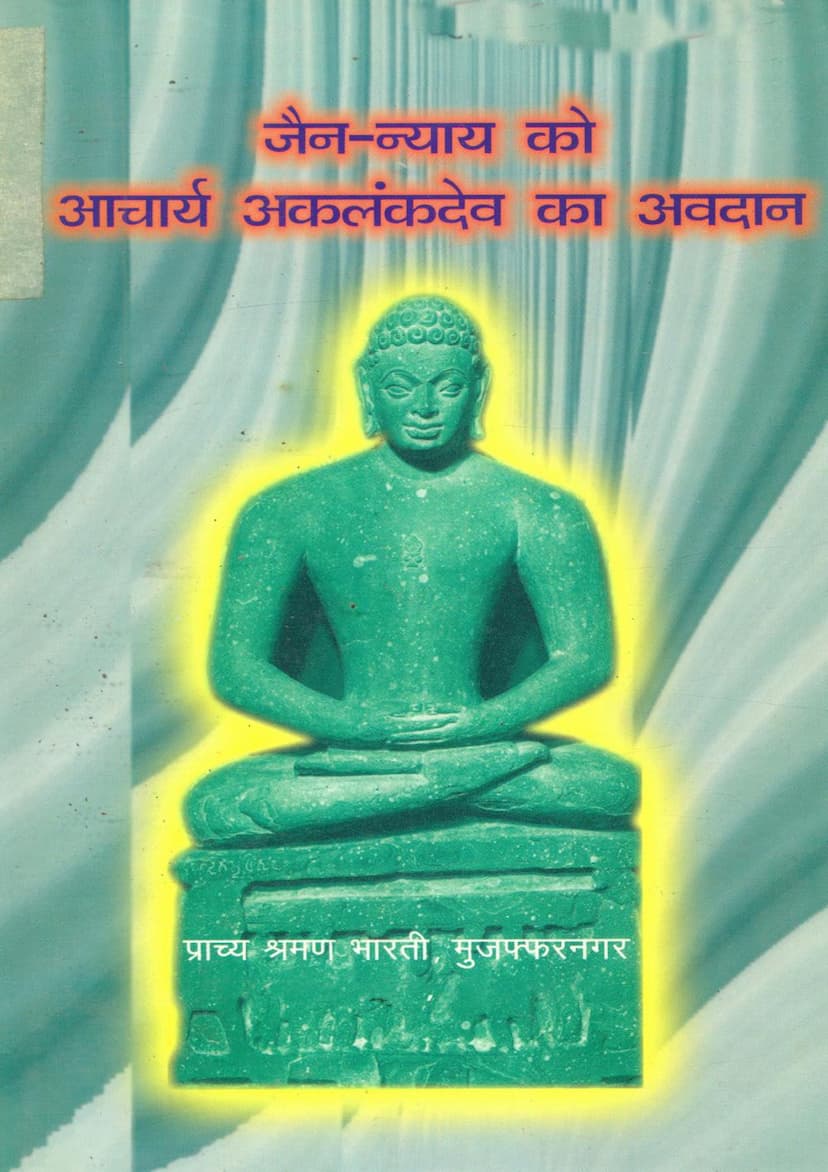Jain Nyaya Me Akalankdev Ka Avadan
Added to library: September 2, 2025

Summary
Here's a comprehensive summary of the Jain text "Jain Nyaya me Akalankdev ka Avadan" by Kamleshkumar Jain:
This book, published by Prachya Shraman Bharati in Muzaffarnagar, is a compilation of research papers presented at a national seminar held in Shahpur (Muzaffarnagar) from November 27-29, 1996. The seminar was dedicated to the contributions of Acharya Akalankdev to Jain Nyaya (Jain logic and philosophy). The publication was brought out on the eleventh initiation anniversary of Param Pujya Upadhyaya Shri 108 Gyanasagarji Maharaj.
Central Theme:
The core of the book revolves around Acharya Akalankdev's profound and indispensable contributions to the field of Jain Nyaya. It highlights his role in establishing, developing, and defending Jain philosophical and logical systems against various contemporary schools of thought.
Key Figures and Context:
- Acharya Akalankdev: Revered as a pivotal figure in Jain philosophy, often considered the "father" or "founder" of Jain Nyaya. He is credited with systematically presenting and defending Jain doctrines, particularly through his rigorous logical arguments.
- Upadhyaya Shri 108 Gyanasagarji Maharaj & Muni Shri Vairagyasagarji Maharaj: These spiritual leaders were instrumental in inspiring and organizing the seminar, demonstrating their commitment to promoting Jain knowledge and honoring great Jain scholars.
- Prachya Shraman Bharati: The publishing house that took on the responsibility of compiling and disseminating the research papers, thus making the scholarly contributions accessible to a wider audience.
- The Seminar: The national seminar brought together numerous scholars from across India to present their research, fostering intellectual exchange and deeper understanding of Akalankdev's work.
Acharya Akalankdev's Contributions and Significance:
The book details Akalankdev's impact through various facets:
- Systematization of Jain Nyaya: While acknowledging the foundational work of earlier scholars like Acharya Kundakunda, Acharya Samantabhadra, and Acharya Siddhasen Diwakar, the book emphasizes that Akalankdev brought Jain Nyaya to its mature and robust form. He is credited with establishing its distinct identity and making it intellectually formidable.
- Mastery of Logic and Debate: Akalankdev lived in an era of intense philosophical debates. He was renowned for his intellectual prowess in engaging with and defeating proponents of other philosophical systems, particularly Buddhism. His debates are described as instrumental in defending Jainism and promoting its principles.
- Key Works: The book extensively discusses Akalankdev's major works, classifying them into original treatises and commentaries:
- Original Works: Laghiyastray, Nyayavinishchay, Siddhivinishchay, and Pramanasangraha. These are considered seminal texts for understanding Jain logic.
- Commentaries: Tattvarthavartika (a commentary on Umaswami's Tattvarthasutra) and Ashtashati (a commentary on Samantabhadra's Aptamimamsa).
- The book delves into the philosophical content and significance of each of these works, analyzing their arguments, conclusions, and their place within the broader Jain philosophical tradition.
- Defense of Jain Principles: Akalankdev's writings are a testament to his dedication to defending core Jain principles such as Anekantavada (non-absolutism/multi-sidedness) and Syadvada (the doctrine of conditioned predication) against criticisms from schools like Buddhism, Vedanta, Samkhya, Nyaya, Mimamsa, and Charvaka.
- Impact on Later Scholars: The book highlights how Akalankdev's logical framework and arguments became the bedrock for subsequent Jain scholars in both the Digambara and Shvetambara traditions. His clarity of thought and rigorous methodology set a standard for Jain philosophical discourse for centuries.
- Specific Philosophical Contributions Discussed:
- Pramana (Means of Valid Knowledge): His meticulous analysis and classification of Pramanas, particularly his nuanced understanding of perception (pratyaksha) and inference (anumana), and how they differ from other philosophical systems. He is noted for reinterpreting pratyaksha to include conventional or empirical knowledge (samvyavaharika pratyaksha) to bridge the gap with other traditions.
- Naya (Standpoints): His detailed exploration of Nayas and their role in understanding reality from different perspectives, crucial for grasping Anekantavada.
- Saptabhangi (Seven-fold Syllogism): His work in clarifying and applying the Syadvada and Saptabhangi, which are essential tools for expressing Anekantavada.
- Critique of Other Philosophies: The book illustrates how Akalankdev systematically analyzed and refuted the doctrines of other Indian philosophical schools, showcasing his deep understanding and critical acumen.
- Human Values in Tattvarthavartika: One section of the book specifically examines the human values embedded in Akalankdev's Tattvarthavartika, such as non-violence (ahimsa), forgiveness (kshama), humility (mardava), honesty (arjava), truthfulness (satya), contentment (santosh), and charity (dana), showing how these are presented within a philosophical framework.
- Definition of 'Jiva' (Soul): The papers discuss the evolution of the concept of 'Jiva' and 'Atma' in Jainism, and how Akalankdev contributed to this understanding, potentially bridging earlier literal interpretations with more subtle, spiritual ones.
- Influence on Later Works: The book traces the influence of Akalankdev's ideas and arguments on later Jain scholars like Vidyananda, Manikyanandi, Prabhachandra, Yasovijaya, and Hemachandra, demonstrating the enduring legacy of his work.
Overall Significance:
"Jain Nyaya me Akalankdev ka Avadan" serves as a comprehensive tribute to Acharya Akalankdev, showcasing his pivotal role in shaping Jain logical and philosophical thought. It underscores his intellectual rigor, his commitment to defending Jainism, and his lasting impact on the tradition. The collection of essays provides valuable insights into the depth and sophistication of Jain epistemology and metaphysics as expounded by one of its greatest proponents. The seminar and its subsequent publication highlight the ongoing effort to preserve and promote the rich intellectual heritage of Jainism.